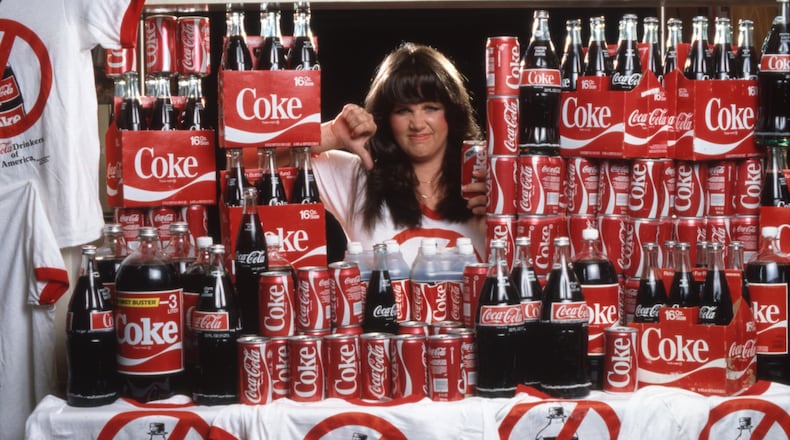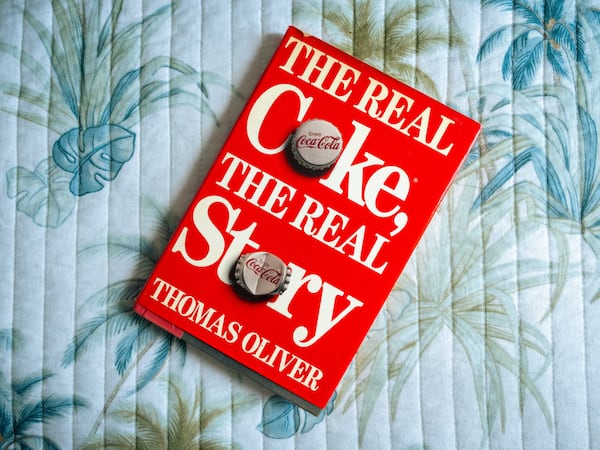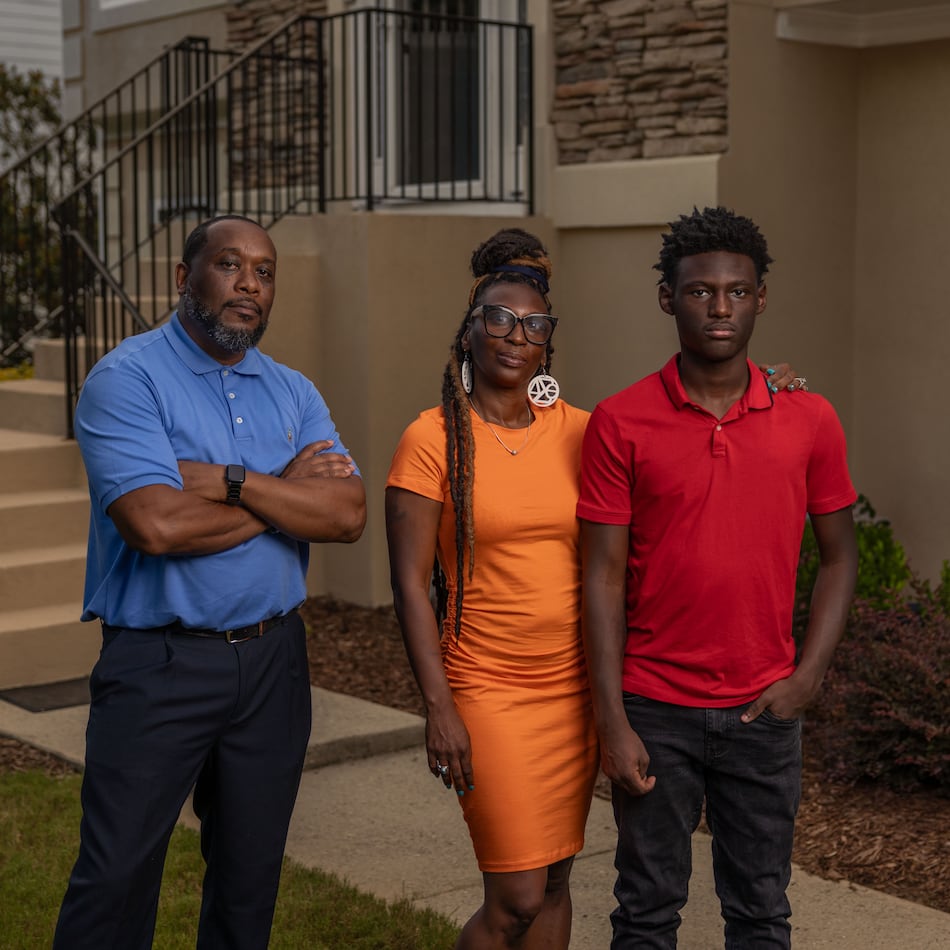It’s been 40 years since Atlanta-based Coca-Cola launched a new formula for its famed namesake cola, called it New Coke and prompted a national outcry — forcing the company to walk back the decision on its biggest blunder ever.
The company has never been able to live it down, and the flub became a case study in what not to do in business.
How could the talented marketing minds in the downtown Atlanta tower have made such a massive mistake?
The decision came in the fog of war — the cola wars, that is.
Back in the mid-1980s, Pepsi was deep in a battle to try to take down Coca-Cola, with advertisements like the “Pepsi Challenge” that showed blind taste tests with people choosing the taste of Pepsi over Coke. A film by Sony on the cola wars involving Judd Apatow and Steven Spielberg is in the works, according to Deadline.com.
Coca-Cola did its own tests to come up with a new formula.
When the company announced the reformulated Coke in New York on April 23, 1985, then-Chairman and CEO Roberto Goizueta called it “the surest move ever made because the new taste of Coke was shaped by the taste of the consumer.”
He said “we found something that tasted better,” and “it wouldn’t be fair to keep a better product away from the consumer,” as reported in The Atlanta Journal.
But “all their instincts were overridden by market research,” said Thomas Oliver, a former reporter and editor for The Atlanta Journal-Constitution who wrote a book about New Coke in the aftermath, “The Real Coke: The Real Story.” “You see all these taste tests, and you see all these numbers, you’re going, ‘How can we be wrong?’”
Credit: Justin Taylor for The Atlanta Journal-Constitution
Credit: Justin Taylor for The Atlanta Journal-Constitution
While the new formula had some fans, the debut of New Coke went very wrong, sparking protests, people pouring New Coke down gutters and thousands of complaint calls to Coke’s headquarters.
In 1985, traditional Coca-Cola was core to the company’s business, and the backlash was an existential threat.
A summary of a Harvard Business School case study on New Coke described it as “marketing’s most famous public disaster,” noting: “The reaction of the American people was immediate and violent, causing three months of unrelenting protest against the loss of Coke.”
One “Cocaphile” quoted in the Atlanta Journal on the New Coke launch called it “the blackest day of my life.”
“From now on, my life will be divided into B.C. and A.C. — before the change in Coke and after the change. I honestly don’t know what I’m going to do,” Coca-Cola aficionado Dan Lauck was quoted as saying. “I figured I’d made it through a divorce and a job change, I can make it through this.”
A protester at a New Coke giveaway event in downtown’s Robert W. Woodruff Memorial Park in May 1985 held up a sign that read: “Our Children Will Never Know Refreshment.”
After 79 days, the decision was reversed, and the original Coke returned as Coca-Cola Classic on July 11, 1985. Coca-Cola Classic saw robust sales after it returned. New Coke soldiered on and even got a rebrand but was eventually discontinued in the early 2000s.
Coca-Cola declined to comment on the New Coke anniversary.
Phil Mooney, a longtime archivist at Coca-Cola before retiring in 2013, said the lesson learned from the New Coke debacle was to listen more closely to consumers.
“When all of a sudden this big company says you can’t have this product anymore that you had for 99 years, it took people aback,” Mooney said. Coca-Cola is “something that people were used to having in their households. … Consumers felt that that product belonged to them and not to the company, and we didn’t have the right to tell them what they could have or couldn’t have, you know?”
Credit: Associated Press
Credit: Associated Press
Coke is something that people have “emotional ties” to, Mooney said.
“It’s probably due to the fact that, one, it was a consumer product that was affordable to anybody, regardless of their social or economic status,” he said.
Mooney also believes the taste tests were misleading because if people have a sip of two beverages and are asked which they prefer, they might prefer the sweeter one, like Pepsi.
“Now if you ask them long term, would you drink that every single day? The answer might have been very different,” Mooney said.
The rollout in real life did indeed play out very differently from the taste tests.
“If you’ve been told, ‘Oh, this stuff is sweeter, it tastes worse than Pepsi,’” Oliver said, “then you taste it and go, ‘God, this stuff is sweeter, tastes worse than Pepsi’” — a particularly harsh burn from a Southerner.
“The interesting thing about taste … There’s a lot of psychological stuff going on there — mind games. It’s not just some taste buds,” Oliver said. That’s “why they do so much advertising.”
Perhaps the most crucial problem with relying on the taste tests for New Coke is that consumers “weren’t answering the question (of which taste they preferred) with an understanding that you might be taking something away from us that’s been a part of our lives, you know, our entire existence,” Mooney said.
Yet rather than adding on a new variety like it has since with Coke Zero and countless other flavors, Coca-Cola replaced its original product with New Coke in an effort to gain market share from Pepsi.
“Some of this stuff in hindsight seems so illogical,” Oliver said.
Credit: Justin Taylor for The Atlanta Journal-Constitution
Credit: Justin Taylor for The Atlanta Journal-Constitution
New Coke became legendary after its troubled life span.
In 2019, Netflix’s “Stranger Things,” which was shot in metro Atlanta and is set in the 1980s, featured New Coke in multiple episodes as part of a Coke advertising package.
As part of that partnership, Coca-Cola brought back New Coke very briefly and for a limited run as a gift with purchase from the Coke Store online.
Visitors to the World of Coca-Cola in Atlanta for a few days also got special New Coke cans as a gift.
Credit: RODNEY HO/rho@ajc.com
Credit: RODNEY HO/rho@ajc.com
As part of the “Stranger Things” promotion, Coca-Cola’s principal scientist in global category development Michael Burdett, acknowledged in a written statement: “One of our growth behaviors is celebrating and learning from failure, and New Coke — for better or worse — is known as a failure.”
“Bringing it back in a fun, creative way to support the ‘Stranger Things’ partnership shows we don’t take ourselves too seriously,” he added at the time.
Would there ever be an uprising over the launch of a new soda formula today?
The landscape for the beverage industry is quite different.
“Look at all the products we have in the marketplace today that we didn’t have back then,” Mooney said. “How many variations of cola and other beverages do we have out there?”
Coca-Cola had a single product in the marketplace from 1886 until 1960, he said, and Americans didn’t have the number of choices they have today.
“This was really something spectacular that happened” with New Coke, Mooney said. If there were a protest of a new beverage taste in 2025, “I doubt if it would have been as extreme as it was” in 1985.
About the Author
Keep Reading
The Latest
Featured







